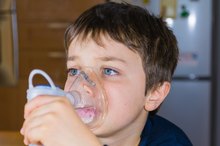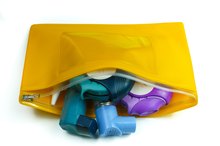Difference Between Nebulizer and Humidifier
Nebulizers and humidifiers are used for aerosol therapy, a common form of treatment for respiratory ailments such as asthma. Both nebulizers and humidifiers convert liquids into a fine mist that can easily be inhaled into the airways to alleviate respiratory symptoms. However, nebulizers and humidifiers differ in function and intended use for people with asthma. Whereas nebulizers are used to deliver medication to the lungs, humidifiers simply provide moisture. Both devices may be useful for some people with asthma, but take care to use them as intended and to maintain them according to manufacturer’s instructions.
If you are experiencing serious medical symptoms, seek emergency treatment immediately.
Use of Nebulizers for Asthma
Nebulizers convert liquid asthma medications into tiny droplets that can be inhaled into the lungs. They are commonly used to deliver quick-relief medications known as bronchodilators, such as albuterol or levalbuterol (Xopenex). Long-term controller medications called inhaled corticosteroids, such as budesonide (Pulmicort Respules), can also be delivered with a nebulizer. Nebulizers are a convenient alternative to inhalers for young children and others with asthma who may have difficulty using an inhaler.
- Nebulizers convert liquid asthma medications into tiny droplets that can be inhaled into the lungs.
- Nebulizers are a convenient alternative to inhalers for young children and others with asthma who may have difficulty using an inhaler.
Choosing the Right Nebulizer
List of Nebulizer Medications and Ingredients
Learn More
The size of liquid droplets in a vaporized mist can affect a drug’s ability to reach the lungs. Therefore, advances in nebulizer technology have mainly focused on generating a more uniform, ultra-fine mist. There are three primary types of nebulizers: jet, ultrasonic and mesh. These devices differ in the mechanism used to convert liquid medication into an aerosol. Home-use, tabletop styles and portable nebulizers are available. When recommending a nebulizer, your doctor will consider the specific medication to be delivered, as some medication manufacturers recommend a specific type of nebulizer. Other considerations include the cost of the unit, insurance coverage, and the ability to use and maintain the unit correctly.
- The size of liquid droplets in a vaporized mist can affect a drug’s ability to reach the lungs.
Use of Humidifiers for Asthma
Low humidity can dry out the airways and increase the risk of upper respiratory infections, according to research published in March 2009 in "Respiratory Medicine." Both extremely dry air and respiratory infections can provoke asthma flareups. Humidifiers generate water aerosols that increase the humidity of circulating air. For some people with asthma, a humidifier can be beneficial if the indoor air is exceptionally dry. However, too much humidity can also be potentially harmful. The 2007 "Guidelines for the Diagnosis and Management of Asthma" commissioned by the National Institutes of Health do not recommend use of humidifiers for people with dust mite or mold allergies because humid environments promote the growth of these substances, which can aggravate asthma symptoms 4.
- Low humidity can dry out the airways and increase the risk of upper respiratory infections, according to research published in March 2009 in "Respiratory Medicine."
- The 2007 "Guidelines for the Diagnosis and Management of Asthma" commissioned by the National Institutes of Health do not recommend use of humidifiers for people with dust mite or mold allergies because humid environments promote the growth of these substances, which can aggravate asthma symptoms 4.
Choosing the Right Humidifier
What Is the Difference Between a Vaporizer and a Nebulizer?
Learn More
Too much or too little humidity can be problematic for people with asthma, so it's important to monitor indoor relative humidity if using a humidifier. The "Guidelines for the Diagnosis and Management of Asthma" recommend keeping indoor humidity at 30 to 50 percent 4. Portable and whole-house humidifiers are available. Portable units are a convenient, affordable way to humidify small spaces. However, it's important to choose one with a humidistat so the unit shuts off automatically once the humidity reaches the preset level. Whole-house humidifiers have a humidistat and are connected to a home's duct system so that humidified air is circulated evenly in all rooms. Ease of cleaning is another consideration, as mold and bacteria can grow in a poorly maintained humidifier.
Medical advisor: Shilpi Agarwal, M.D.
- Too much or too little humidity can be problematic for people with asthma, so it's important to monitor indoor relative humidity if using a humidifier.
- Ease of cleaning is another consideration, as mold and bacteria can grow in a poorly maintained humidifier.
Related Articles
References
- Chest: Device Selection and Outcomes of Aerosol Therapy: Evidence-based Guidelines: American College of Chest Physicians/American College of Asthma, Allergy, and Immunology
- National Heart, Lung, and Blood Institute: Guidelines for the Diagnosis and Management of Asthma (EPR-3)
- American Academy of Allergy, Asthma & Immunology. Inhaled Asthma Medications. Updated 2020.
- Máiz carro L, Wagner struwing C. Benefits of nebulized therapy: basic concepts. Arch Bronconeumol. 2011;47 Suppl 6:2-7. doi: 10.1016/S0300-2896(11)70028-X
- Murayama N, Murayama K. Comparison of the Clinical Efficacy of Salbutamol with Jet and Mesh Nebulizers in Asthmatic Children. Pulm Med. 2018;2018:1648652. doi:10.1155/2018/1648652
- Usmani OS, Lavorini F, Marshall J, et al. Critical inhaler errors in asthma and COPD: a systematic review of impact on health outcomes. Respir Res. 2018;19(1):10. doi:10.1186/s12931-017-0710-y
- Moriates C, Feldman L. Nebulized bronchodilators instead of metered-dose inhalers for obstructive pulmonary symptoms. J Hosp Med. 2015;10(10):691-3. doi:10.1002/jhm.2386
- The Cleveland Clinic. Home nebulizer instructions. Updated November 20, 2019.
- Stephan Ehrmann. Vibrating Mesh Nebulisers – Can Greater Drug Delivery to the Airways and Lungs Improve Respiratory Outcomes? Respiratory & Pulmonary Diseases. 2018;4(1):33–43. doi:10.17925/ERPD.2018.4.1.33
Writer Bio
Aisha Cobbs has been writing medical and scientific articles since 2008. Her articles have appeared in Heart and Circulation Physiology and the Journal of Pharmacology and Experimental Therapeutics.Cobbs holds a doctorate in physiology from Georgia Health Sciences University.







